Then And Now: See How Much Places Have Changed
It’s often said that the past is another country. While that may not be true in all cases, comparing the memories you have of your old neighborhood or hometown with the places they are today can be an astonishing experience. That’s doubly true for comparing places one hundred years ago. Not many of us are lucky enough to live that long.
Fortunately, we have photographs. Check out these side-by-side pictures and look in wonder at how times have changed —or in some cases, stayed the same. They’re a good reminder about how much progress can be made in only a few decades—and how fragile our world of construction, fashion, and technology is.
The Colosseum
Check out this before and after picture of a Greek-style colosseum in Turkey, thought to have still been in use in 3 A.D. This is where warriors and slaves would presumably go to test themselves in combat, willingly or not.
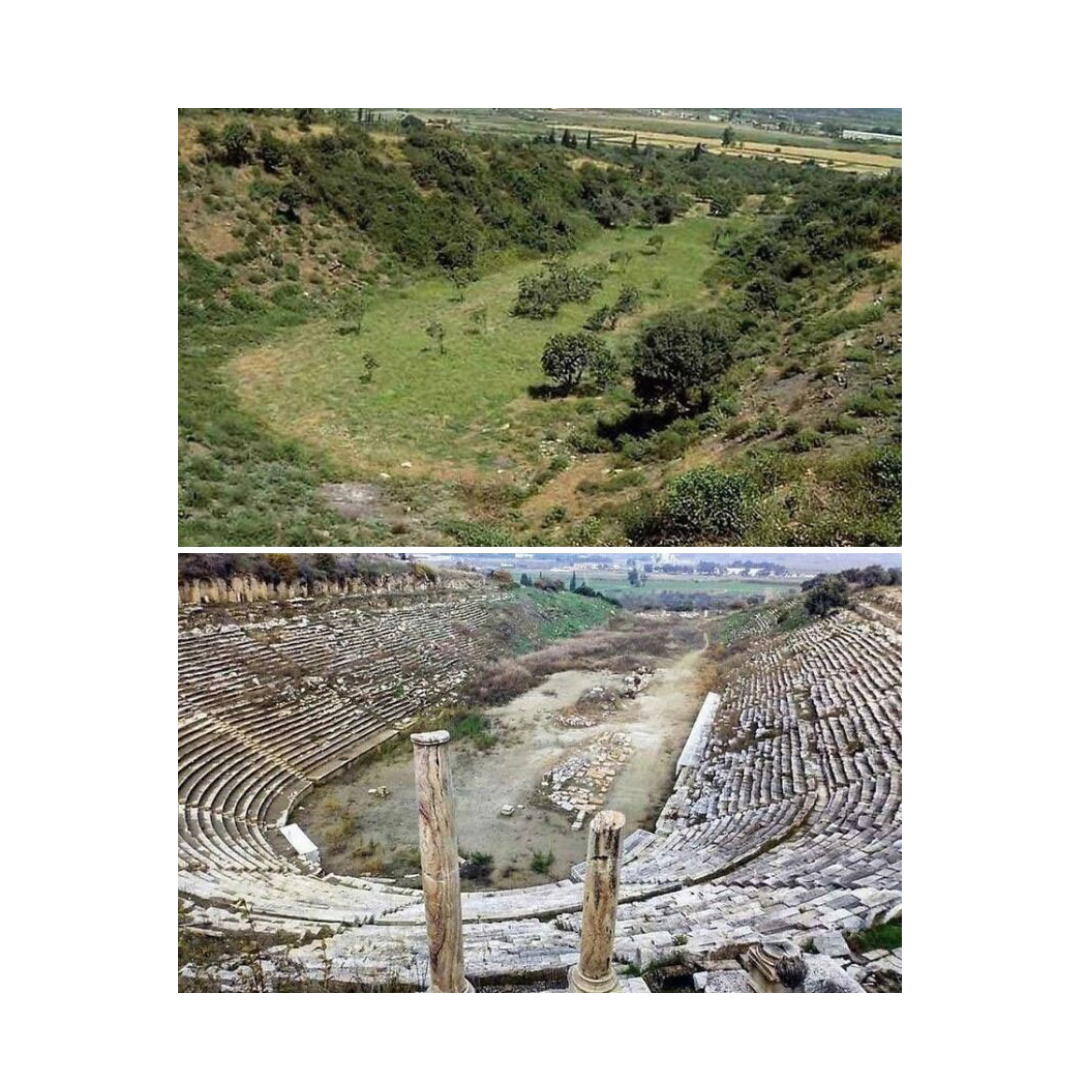
Before archeologists uncovered this site, it looked like any old hill and field. Amazing! They didn’t just uncover steps, but murals and stone carvings, too. It’s amazing how nature just takes back control over all of humanity’s work once our presence is no longer felt.
The Wall
Some people thought that this wall would never come down, but as time proves, again and again, nothing lasts forever. The Berlin wall came down between 1989 and 1994, marking the end of a long division between the German people.
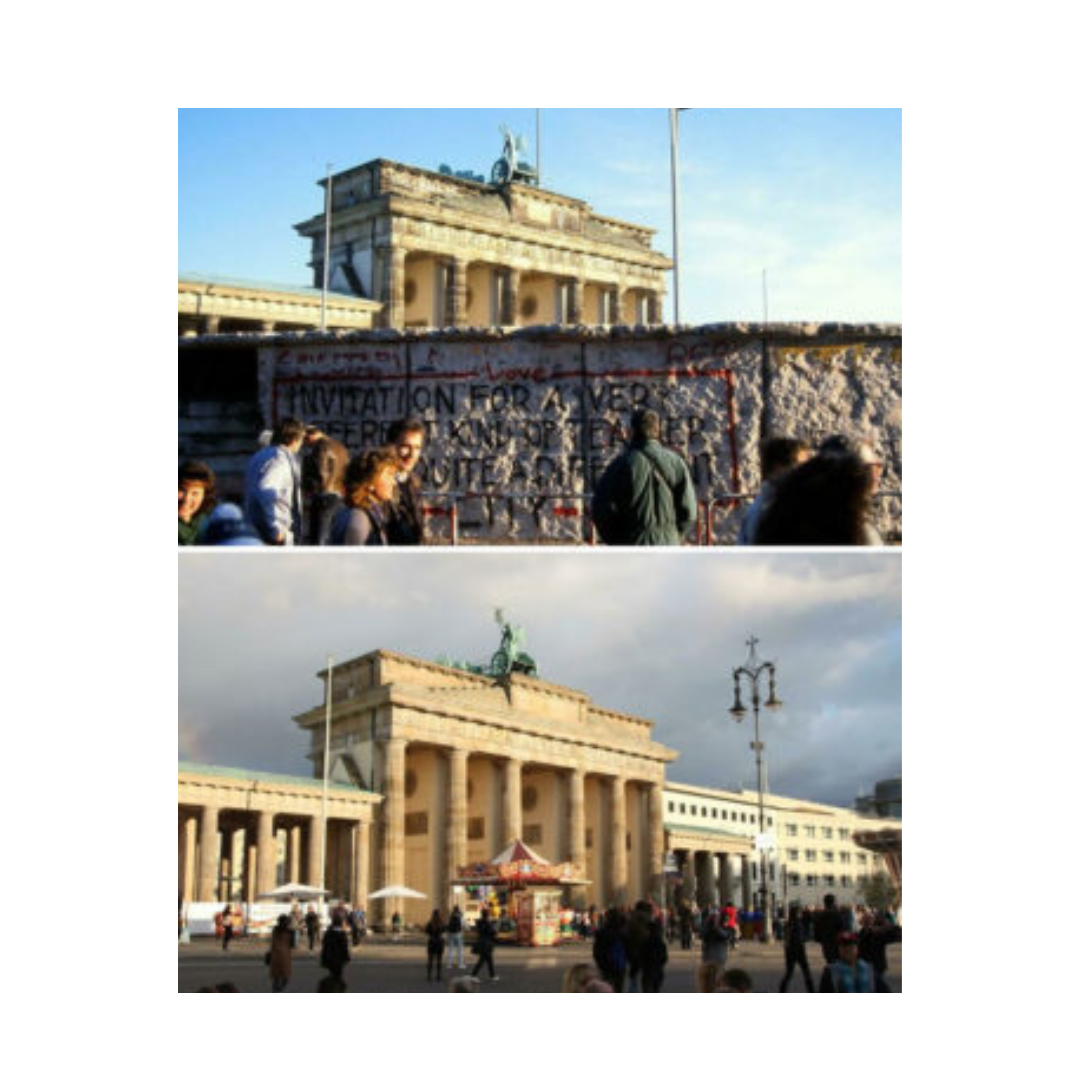
Here’s the Brandenburg gate on display for anyone on either side of the wall to see. Berlin looks better with its people united. Before the wall came down, it was illegal to cross over to the other side, even to see family and friends.
Hiroshima’s Reconstruction
The atom bomb dropped on Hiroshima devastated everything and everyone in its blast radius. In the first picture, it’s hard to imagine anything growing here ever again. But As you can see, a beautiful city with plenty of trees was built on top.
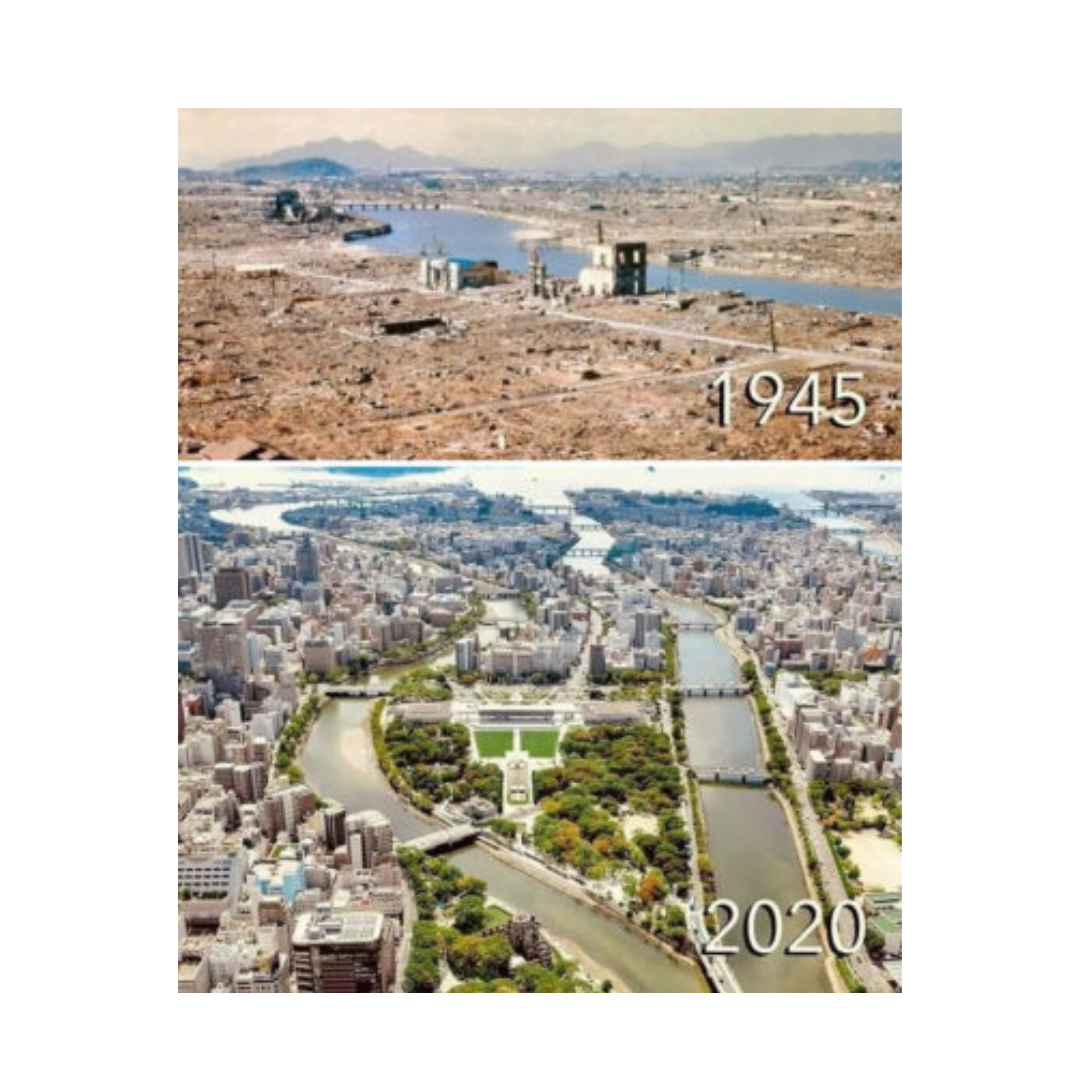
It took 75 years, but this is what reconstruction can do. After the whole planet had been plunged into a deadly conflict, American forces dropped the bomb on Hiroshima at the end of World War II. effectively putting an end to the war.
The Excavation Of Machu Picchu
Here’s a reminder that once humans disappear, nature moves in. Machu Picchu was thought to have been last occupied before the arrival of the Spanish in the late 1500s before they brought down most of the civilizations on the continent with bloodshed and smallpox.
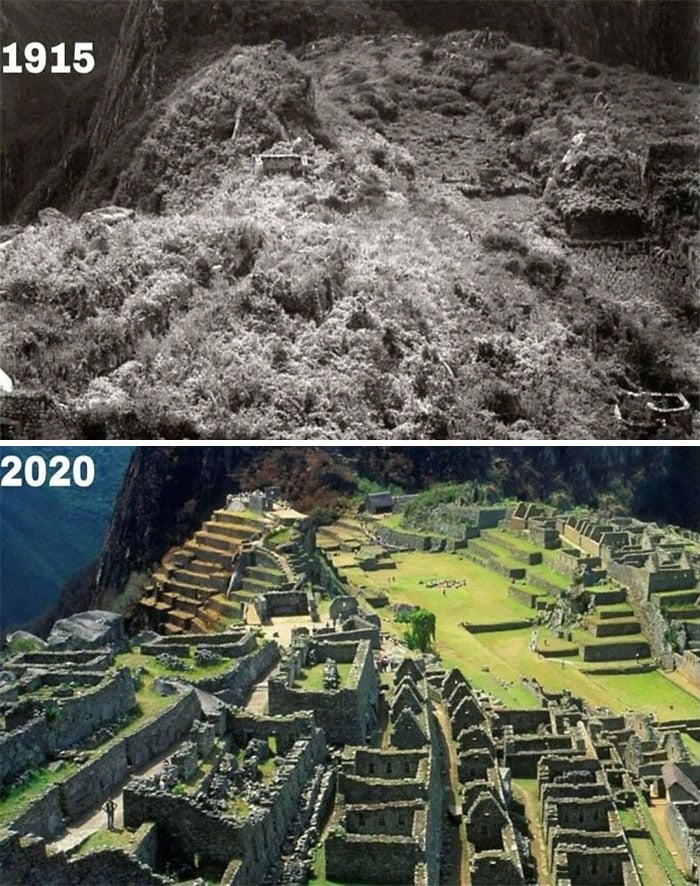
It’s thought that most of the people here died of smallpox before the conquistadors actually arrived. It took archeologists three years to clear this structure of its natural cover. Just imagine what else nature is hiding out there in the world!
The Family Homestead
This photograph, taken in 1900, commemorates the building of a home that would be in the family for the next hundred or so years. After that much time, this family must have had such a strong emotional attachment to this home.
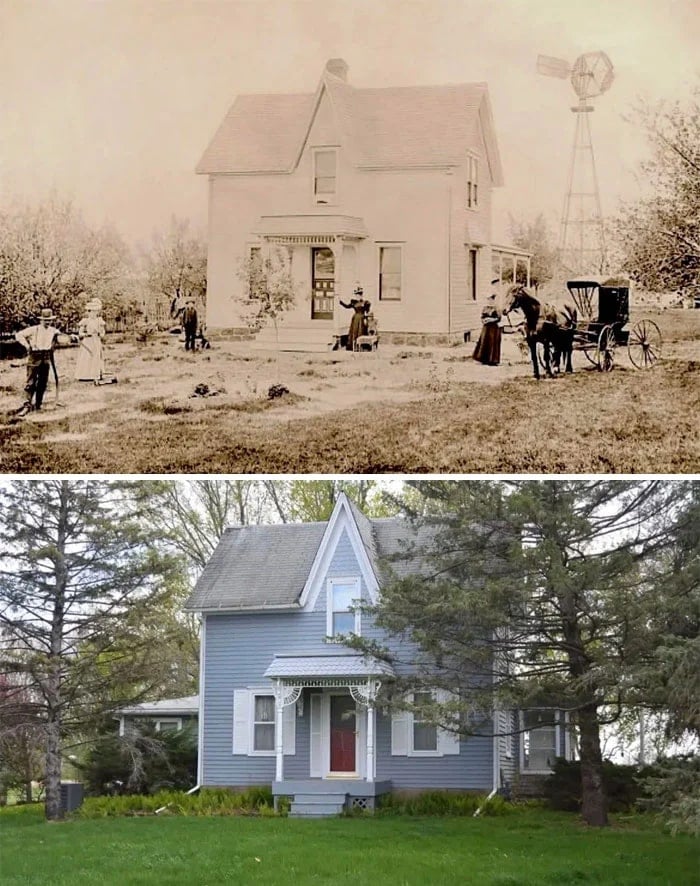
The second picture was taken in 2000. Imagine sleeping in a bedroom owned by your father and your father’s father. That’s the room behind the window above the front door. It looks like they kept the place looking very neat and tidy.
The Golden Cross Inn
Here’s another one that kept its look despite the passage of time. Can you guess how old this historic public house, or as they say across the pond, this Coventry pub in England, is? The first picture is a painting completed in 1819. The photograph below was taken in 2019.
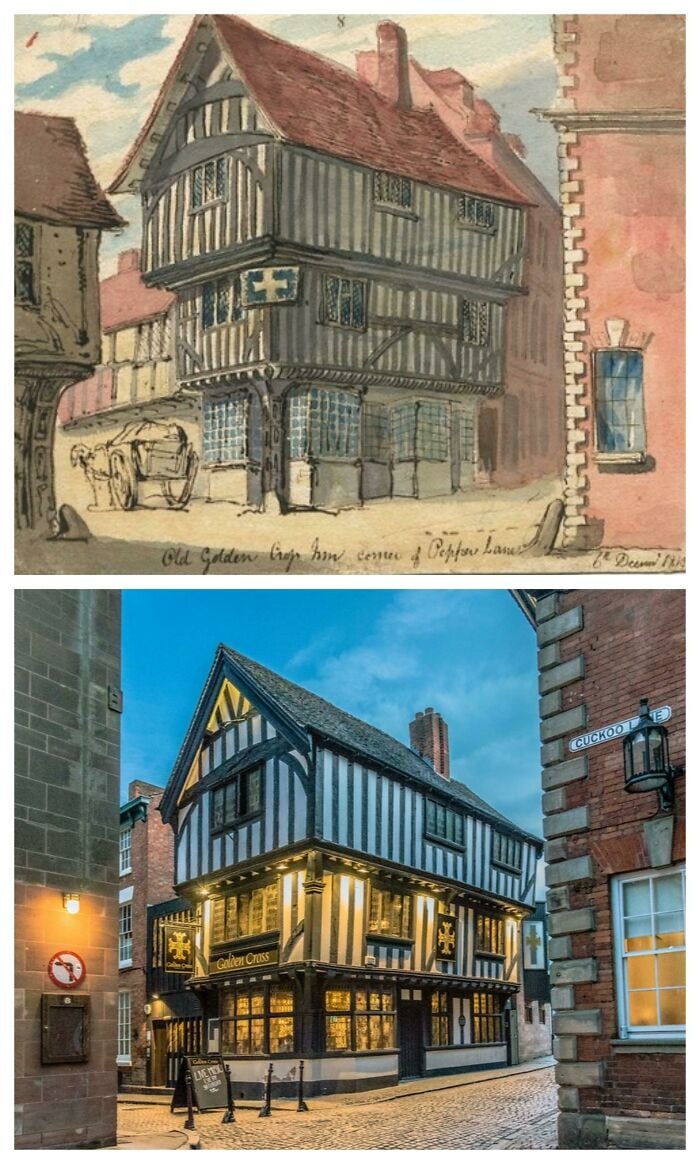
Except for the addition of a traffic sign and electrical lighting, this spot looks almost the same as it was two hundred years ago. The building to the back has changed, but otherwise, a patron who had suddenly found themselves thrown forward (or backward) in time wouldn’t notice until at least the morning after.
An Old View Of The Delaware
Here’s a direct contrast between past and present. Here the past is being depicted in black and white—they did have color back then! Just not color cameras. In the background is Washington Crossing The Delaware, as viewed by museum-goers from the present and the past.
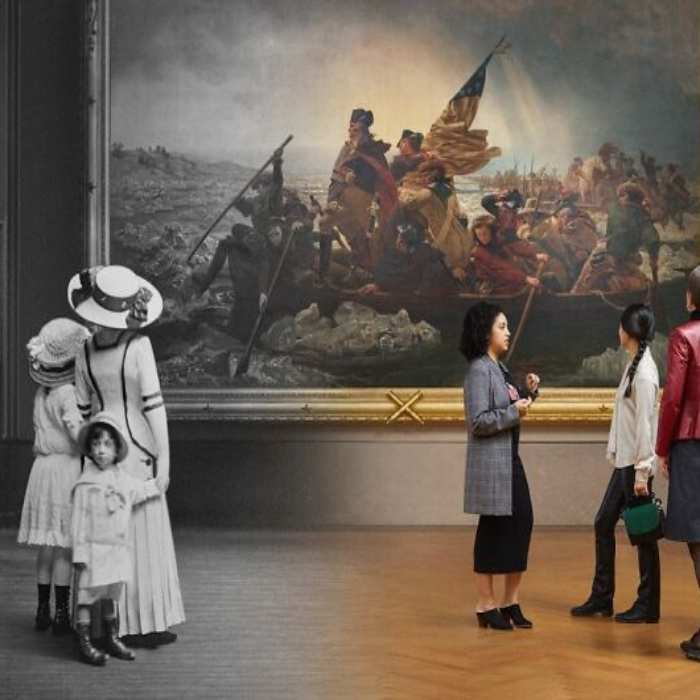
The style of dress is so different. We wonder what the older visitors would have thought about their future counterparts dressed as they are—the woman in the middle wearing pants, for example.
Prague Then And Now
Prague was a stunning city—and obviously, it still is, as you can see from this photo of a slanting street with beautiful brick buildings and cobbled streets. The black and white photo was taken way back in 1910. It’s sparsely populated, and there seems to be a single motorcar or carriage on the road.
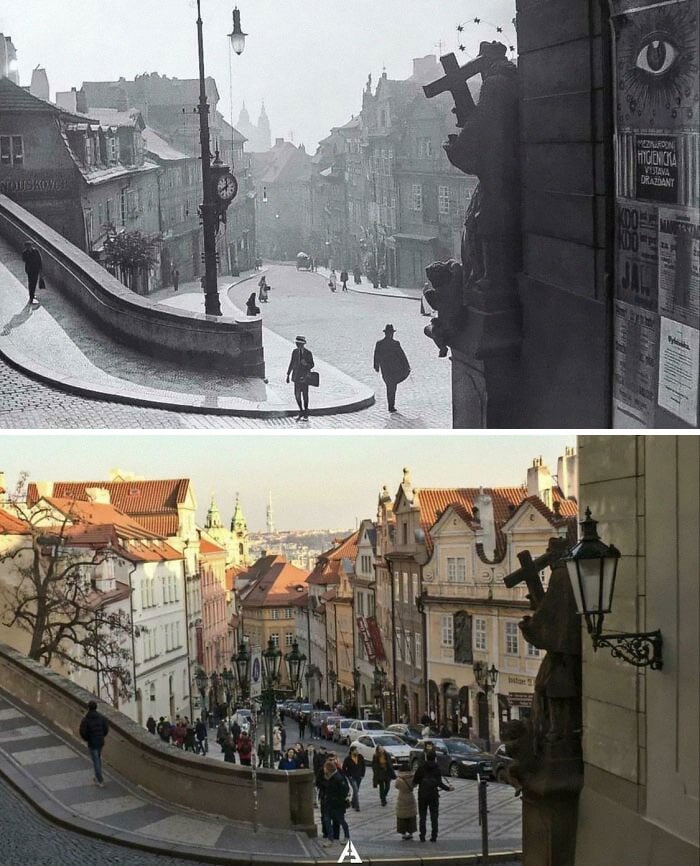
Now the streets are packed, as too are the sidewalks, lined with parked cars. A tree has grown in place of the old streetlight and clock, and a few notices have gone, but otherwise, it seems that nothing much has changed.
Wartime Snapshots
If you’re lucky enough to be living in a country currently enjoying peacetime and prosperity, it can be wild looking back at some of the more deadly times in history. Here’s a snapshot that was taken in Uelzen, Germany, in 1945 during World War II.
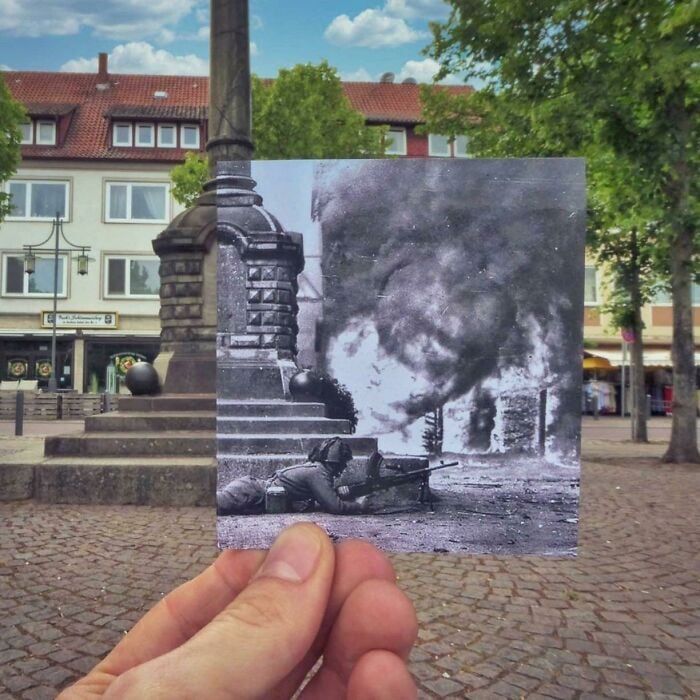
It’s amazing the way this person superimposed a window into the Battle of Rhine onto the present. Everything matches up perfectly, apart from the soldier with his rifle, the explosion, and the burning fire in the background. Well, quite a few things have changed.
Life Imitates Art
This may well have been how Vincent Van Gogh saw this cafe in Arles, France—or perhaps the cafe capitalized on the painting to draw in customers. Whatever the case may be, the lighting and colors between these pictures share an uncanny resemblance.
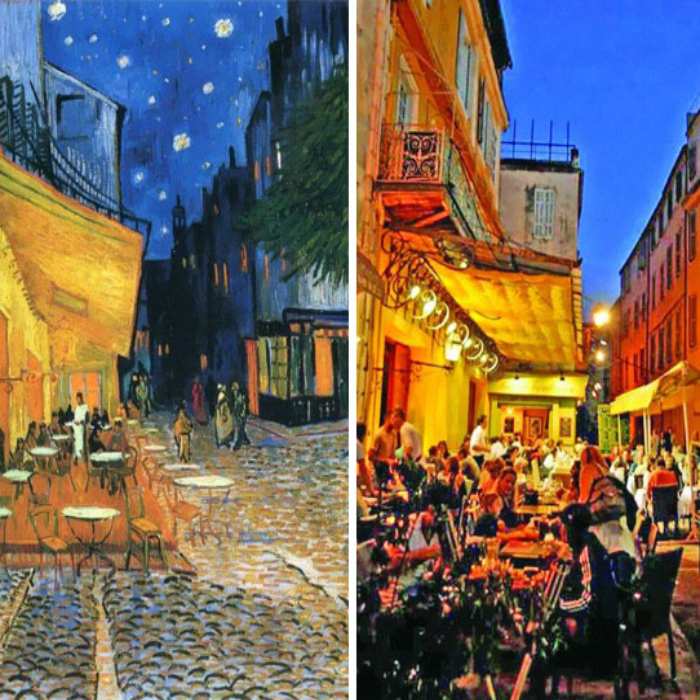
Perhaps it’s just a coincidence between these pictures, but every modern picture seems to be more occupied by people, and this one is no different. Back then, in 1888, the world was populated by fewer than a billion people—now we’ve gone beyond seven, approaching eight!
Rebuilding The Ruins
By the end of World War II, much of Europe was in ruins and disarray. The picture on the left depicts the church of St. Martin in Cologne, Germany. Huge chunks of the structure had been blown off, including the rooftop, by artillery and bombs.
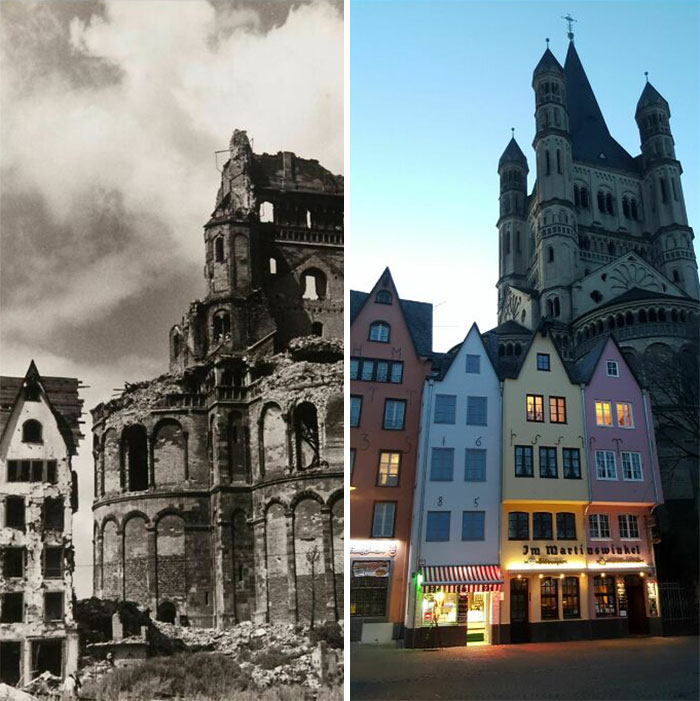
But the picture on the right depicts the building fully restored in 2021. The slim buildings at its fore were also replaced in the same style. It took a lot of work, care, and craft, but the scene has been returned to its former beauty.
Castle Walls
When you think of England, you probably think of rain, bad food, the queen, and castles. Here’s a medieval wall and entrance from 1865. The picture was taken in York, a city famous for still having city walls. Of course, the city has spilled out since then, but the walls and castles remain.
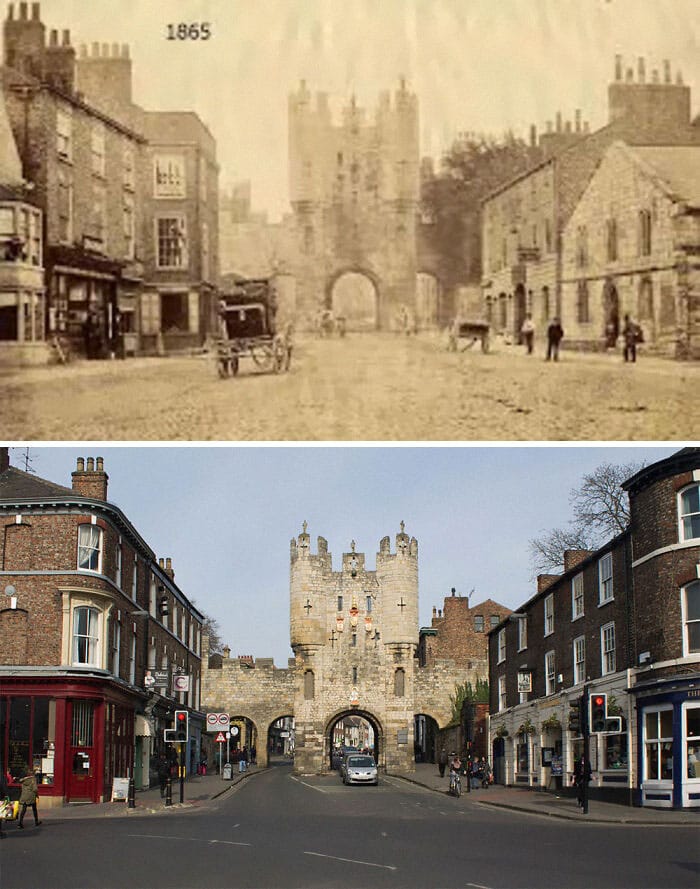
Only 250 years ago, life in a city was quite different from what it is today. Cities were strongholds, places where people would seek protection from rival gangs known as “great houses.” Sometimes the biggest gangs, led by kings, would offer peasants protection in exchange for their total obedience. Hence, all those castles and walls.
The Underground Station
While you may be used to taking the subway on a daily basis if you live in a city, this type of thing would have been a great novelty back then. This is Baker Street, the world’s oldest underground train station, built in 1863 in England.
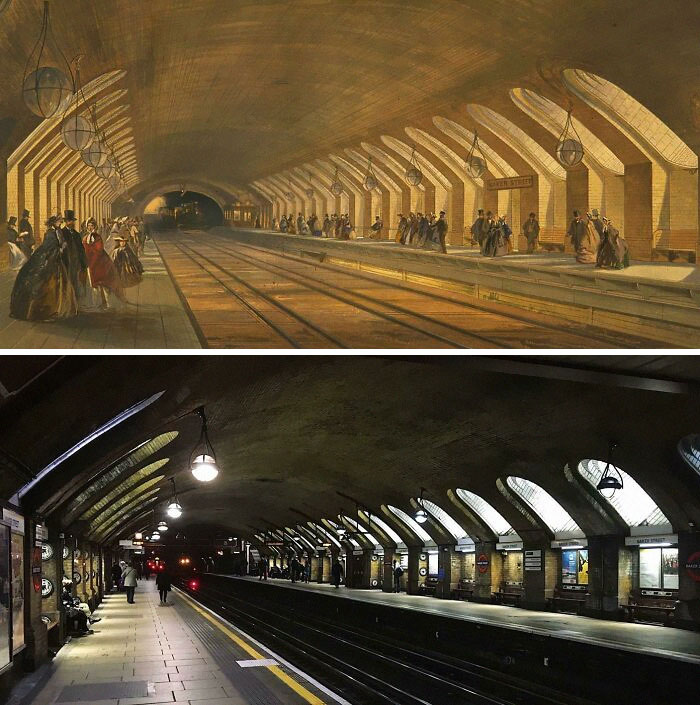
It is underground and quite dark, but as you can see, the architects provided windows for the public so that they wouldn’t feel quite so underground. Nowadays, we’re used to the feeling, even inside high-up office buildings!
The Old Restaurant
This old Brazilian restaurant, built in Petropolis in the 1960s, would have looked practically spaced-aged in its heyday. Now, however, it stands ruined and unused. Everything, including the furniture, bar, and glass windows, has been stripped away.
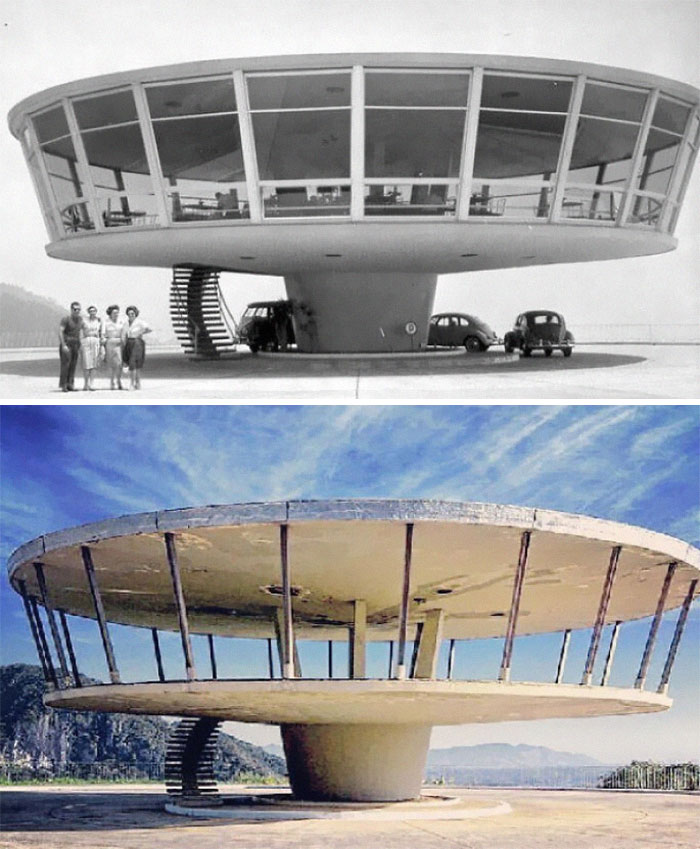
It’s a great shame that it fell apart like this. We can imagine it has an amazing view from up high. It has such an interesting shape and design. We would have loved to have dined at this spot. We can imagine that it would have made for a very interesting place to meet friends or date.
The Royal Mile, Edinburgh
Looking at this picture is a little bit like playing spot the difference. Other than the people walking around, the Royal Mile in Scotland looks almost exactly the same in 1847 as it did in 2021. There are minor differences, however. For example, a sidewalk has been cut out.
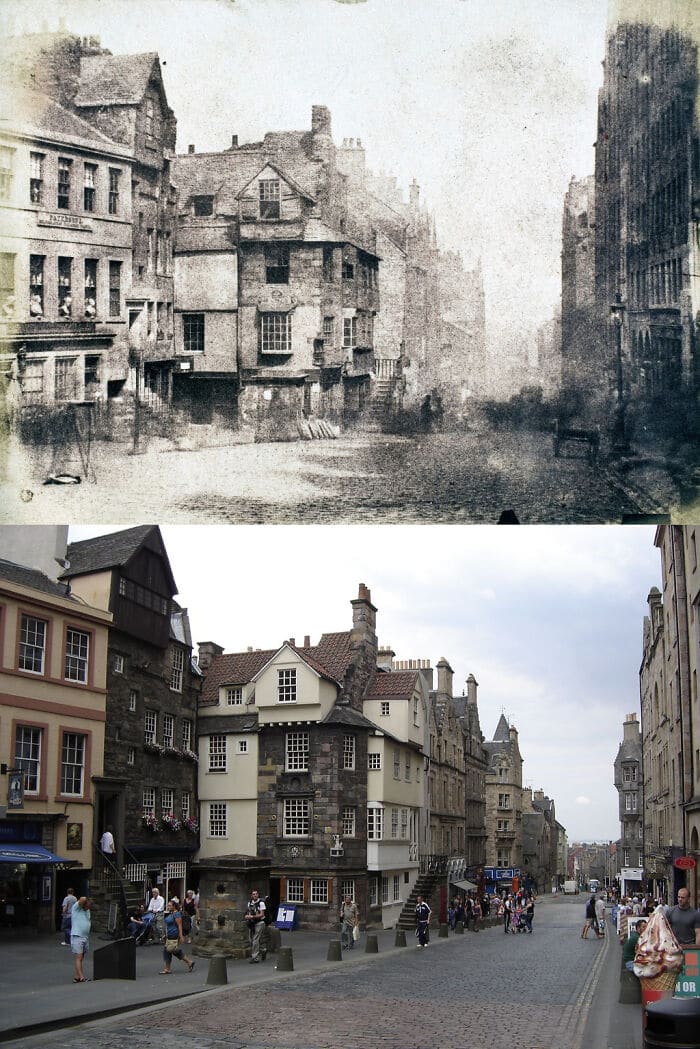
Still, the cobbled road remains. The black and white certainly makes it look antiquated. It would be interesting to match a colorized photo with a modern black-and-white picture and test people if they could tell the difference. How many differences between these shots can you find?
U.S. National Parks
The United States is abundant with naturally beautiful and sweeping landscapes and national parks. Preserving national parks is extremely important and that’s one thing Theodore Roosevelt, America’s 26th president, knew.
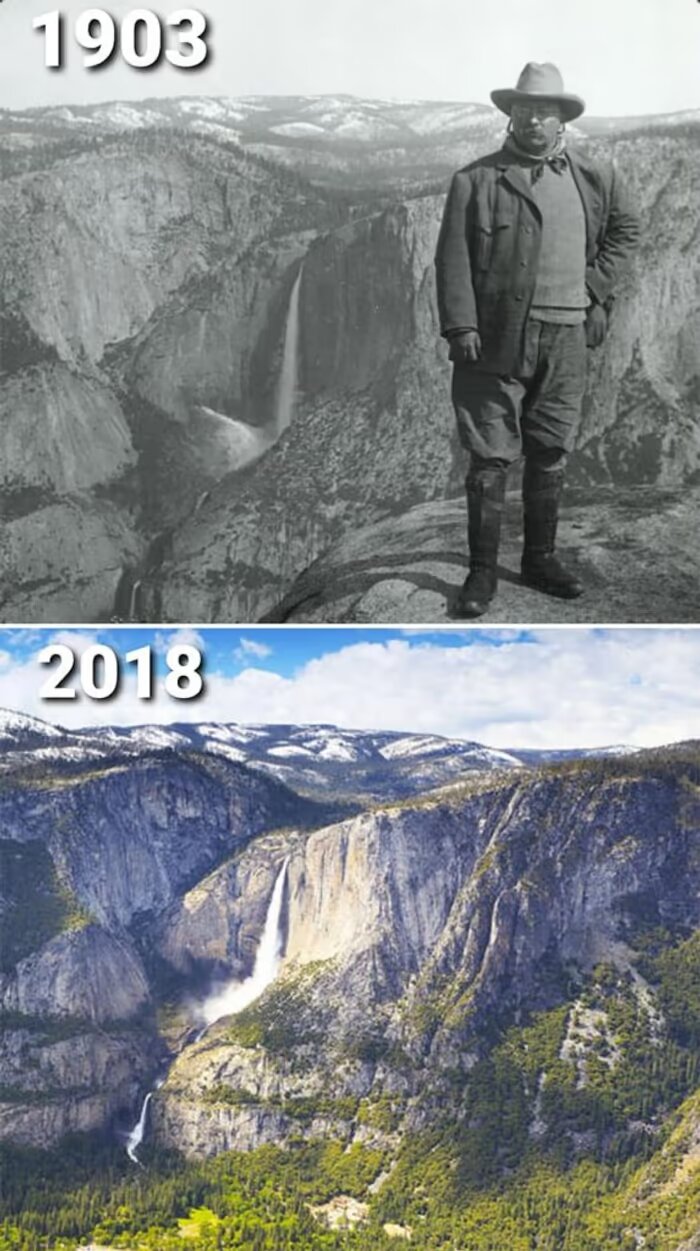
Source: Imgur
In over 220 national reserves, Roosevelt built a legacy of making sure all natural resources and public land were safe. We can see the proof in this then-and-now photo that his efforts paid off. This national park is still just as stunning as it was in 1903.
Pablo Escobar’s Plane Decaying In The Ocean
It’s remarkable and sometimes eerie how photographs demonstrate the passing of time. Glancing at these two photos (one taken in 1985 and the other in 2020), you can clearly that this plane’s exterior hasn’t changed a whole lot.
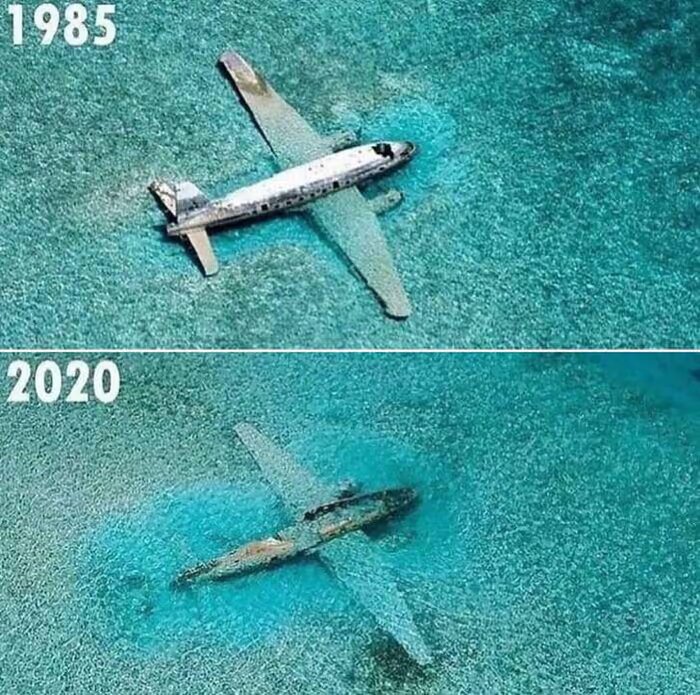
Source: Reddit
Yes, this smuggling plane belonged to none other than the infamous Pablo Escobar. The 2020 photo sees his business transport plane – the Curtiss C-46 Commando – resting in the waters of the Bahamas. The salt in the water sped up the metal plane’s corrosion process.
Folsom Lake Reservoir, Northern California
It’s remarkable and sometimes eerie how photographs demonstrate the passing of time. Glancing at these two photos (one taken in 1985 and the other in 2020), you can clearly that this plane’s exterior hasn’t changed a whole lot.
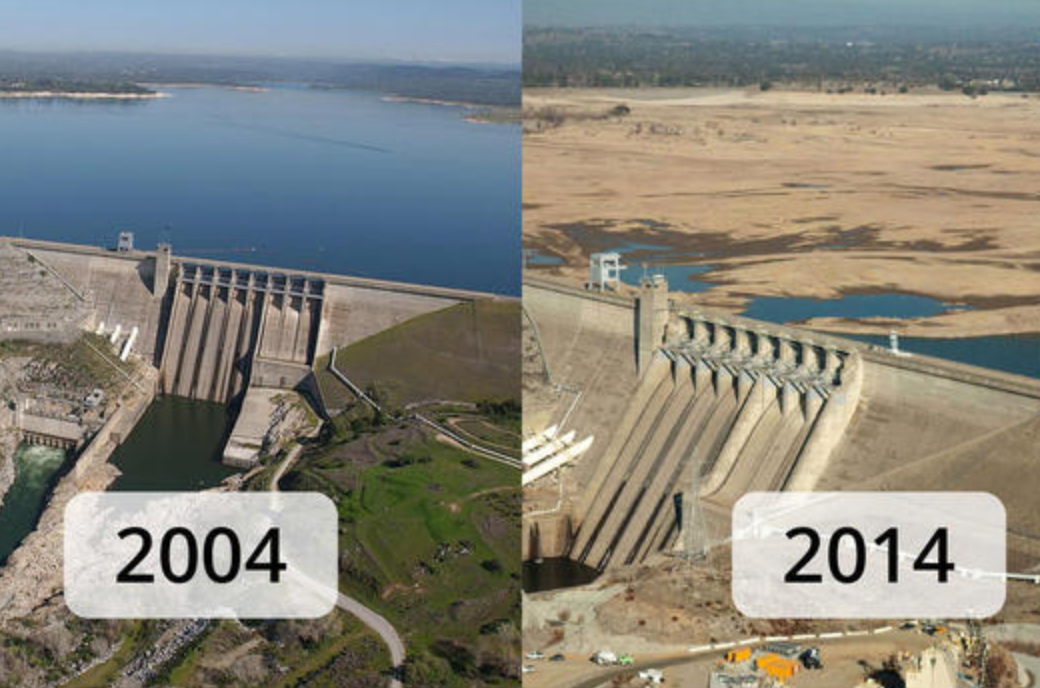
Source: Reddit
Yes, this smuggling plane belonged to none other than the infamous Pablo Escobar. The 2020 photo sees his business transport plane – the Curtiss C-46 Commando – resting in the waters of the Bahamas. The salt in the water sped up the metal plane’s corrosion process.
Los Angeles, CA
The jarring juxtaposition in these photos taken in 1901 and then 2001 is incredible. This is Los Angeles over decades of change. When you first think of the City of Angels, you probably picture palm trees, beaches, and skyscrapers. But, it wasn’t always that way.
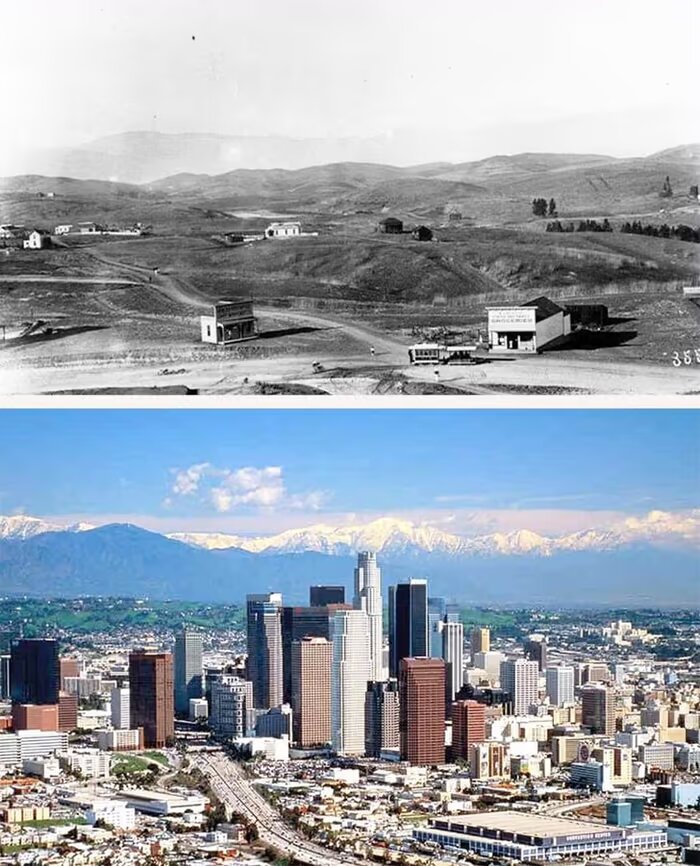
Source: Reddit
In 1901, there wasn’t much to look at aside from rolling hills and a few small homes here and there. So, when you see that LA has since become a booming metropolis, it’s quite shocking.
Downtown Dubai, UAE
Dubai should be the first city that comes to mind when thinking about the Middle East’s ever-growing cities. When the City of Gold was established in 1833, it didn’t possess the enormity of wealth that it does today.
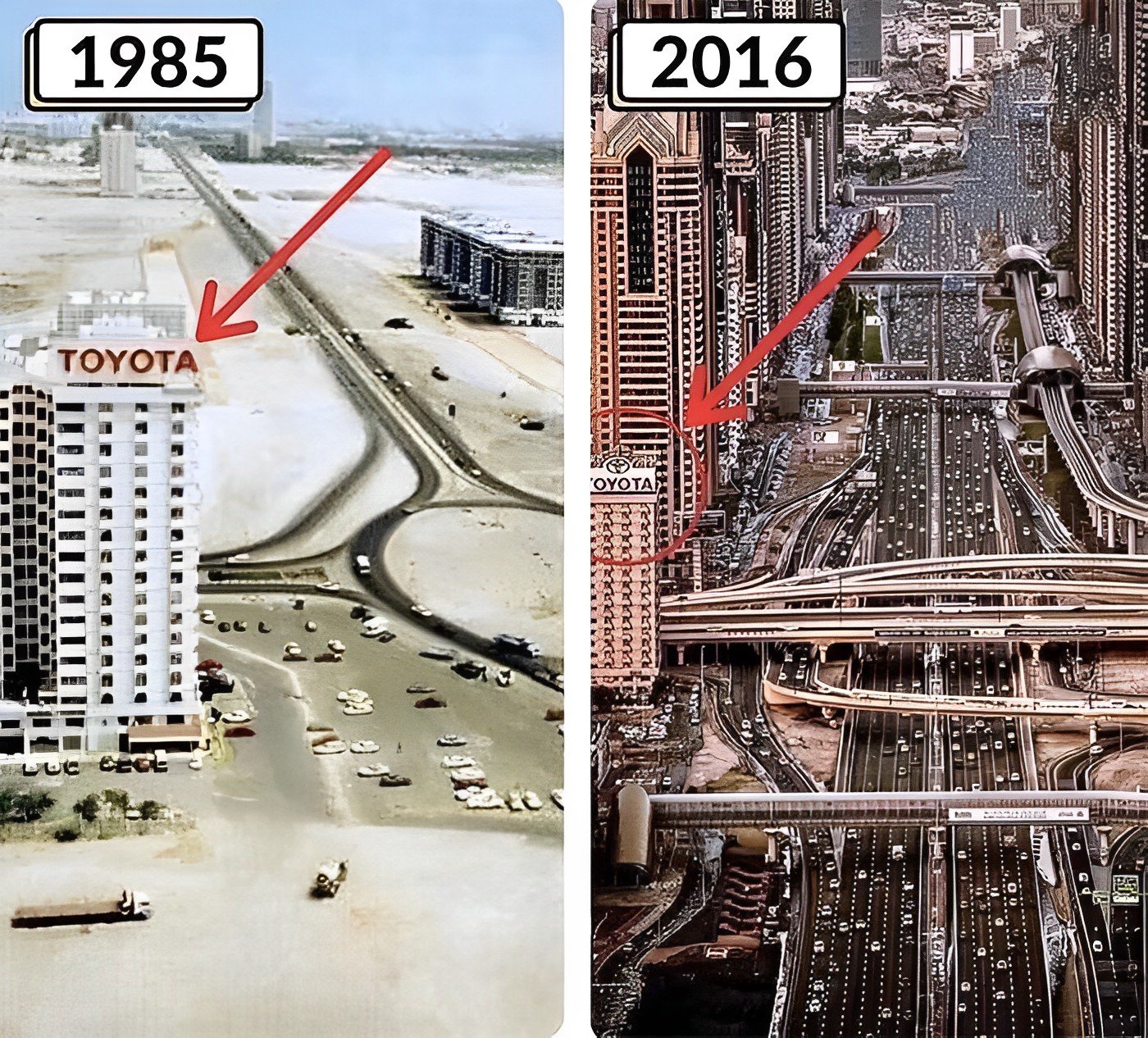
Source: Twitter
The Toyota building was the only skyscraper in 1985, so compared to all the skyscrapers in 2016, it seems tiny! Clearly, the role that urbanization played was largely significant in expanding the population and density of the modern city. Its Palm Jumeirah Island can be seen from space – that’s how gigantic the man-made island is.
Hong Kong
The growth of Hong Kong from 1964 to 2016 is mindblowing. Now, you can barely see the beautiful blue skies underneath all the smog. And, notice how the buildings impact the space, as well.
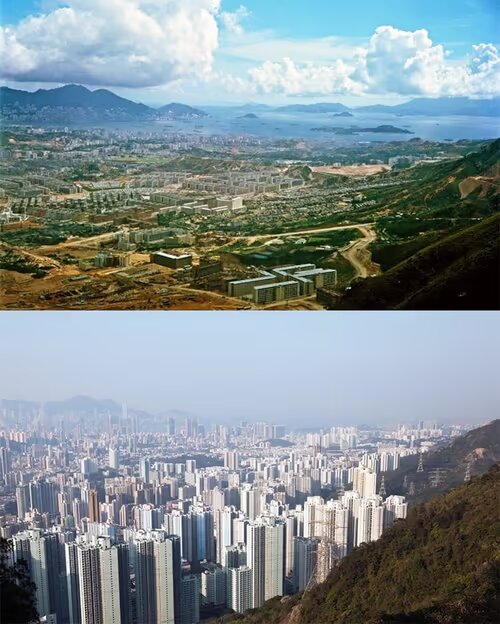
Source: Reddit
Known for its bustling nightlife, Kowloon Peninsula shines bright with neon signs and pops of color. However, the city is known as the “dark side” because of its dense population which pushes the buildings towards the sides of the mountains. There are still plenty of unique finds in Hong Kong.
Singapore
Between 2000 and now, the country of Singapore has undergone tremendous growth and change. Considered one of the most economically successful and stable nations, Singapore prides itself on its hard efforts in manufacturing and industrialization.
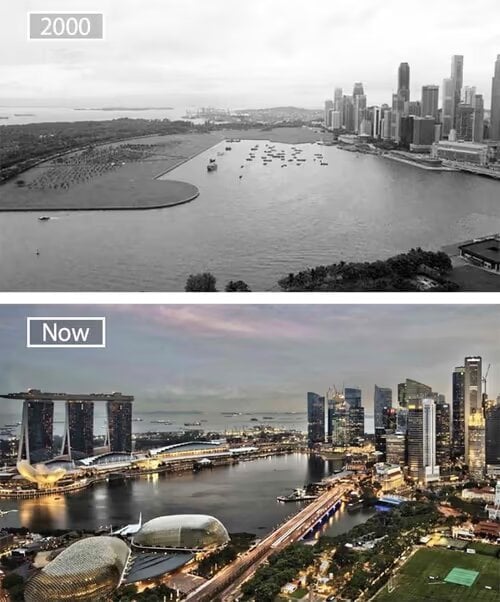
Source: Reddit
Before Singapore separated from the British in 1963, the country was controlled by them for 100 years. As noticed in the photos, the nation carefully planned out its urban development, still allowing space for greenery and nature.
Tokyo, Japan
Isn’t this chilling? The first image looks as if an entire city was wiped out in an apocalypse, while the other looks like something from a big-budget movie. Well, a lot changed between 1945 and today in Tokyo, Japan, known as one of Asia’s most developed countries.
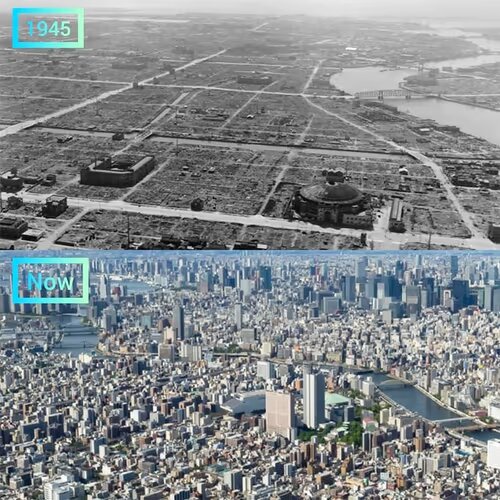
Source: Reddit
Japan’s Shibuya Crossing has five crosswalks and is considered the most bustling intersection. Also, the largely developed Japan became the very first place outside of America to have its own Disneyland park.
Rio de Janeiro, Brazil
Life used to be so much simpler everywhere in the world, especially in Brazil’s most populated city, Rio de Janeiro. There was less of everything back in those days, but one structure still remains the most iconic to this day: the Christ the Redeemer statue on top of Mount Corcovado.
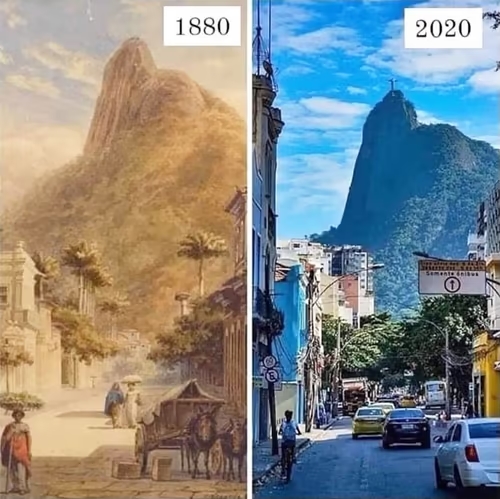
Source: Reddit
The amazing statue stands at a whopping 98 feet, serving as South America’s most easily identifiable symbol. Heitor da Silva Costa was the brilliant engineer behind the design and construction of the statue, which started in 1926.
Thomasville, Georgia’s Giant Oak Tree
Although most of the images shown so far demonstrate how drastically things change over time, these images show that, sometimes, things more or less stay the same. In Thomasville, Georgia, this incredible, giant oak tree remained for more than 300 years.
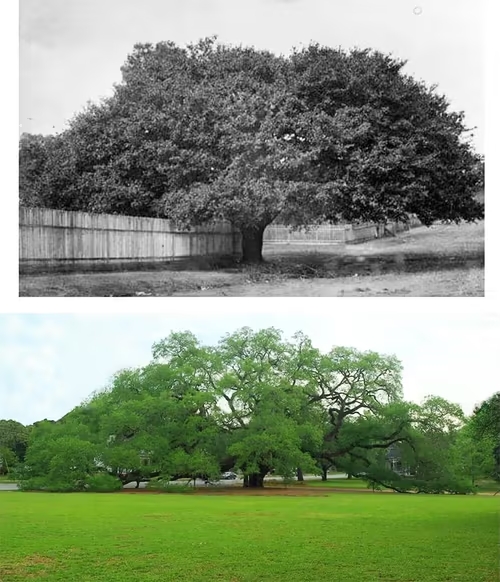
Source: Reddit
In varying directions, the branches kept reaching out and expanding. Because the tree is a Live Oak, the pressure and weight of many of its branches caused sagging and, at some point, breaking. It continues to live on.
Machu Picchu, Peru
Peru is a naturally breathtaking country with so much history and uniqueness to its name. Machu Picchu has remained Peru’s most-visited tourist destination. Beginning in 1912, the archaeological excavation of Peru started with Machu Picchu being unearthed. This practice would keep going until the 1940s.
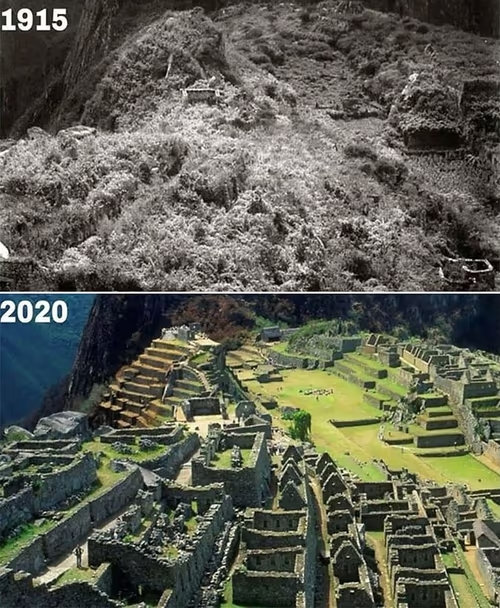
Source: Reddit
Called a “lost” Incan city, Machu Picchu retains about 75% of its original construction and is a “no-fly above” zone, considering it’s perched 7,000 feet above sea level. Those who have visited the site have been able to understand the region and its history more clearly.
Buenos Aires, Argentina Throughout The Decades
Looking at each of these four photos, we can get a better idea of how Buenos Aires has changed over prolonged time periods. They each show how when a solid foundation is built, it’s easier to improve and better it without completely demolishing it.
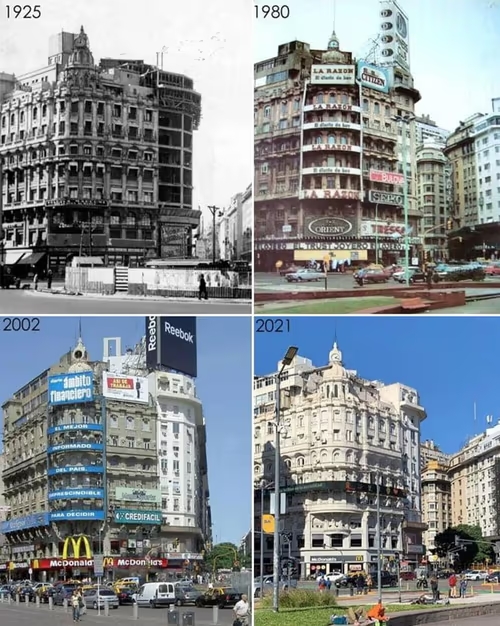
Source: Reddit
From 1925 to 2021, we see the grand Argentinian city of Buenos Aires from one building’s perspective. Remarkably, there weren’t many drastic changes made to the structure’s foundation but used that as the base for its modifications.
An Outdoor Theatre In Bucharest, Romania
In the early 1900s, stage plays were influential in expanding culture. This particular performance took place at an outdoor theatre in Bucharest, Romania in 1916. Sadly, that specific amphitheater didn’t make it in 2016.
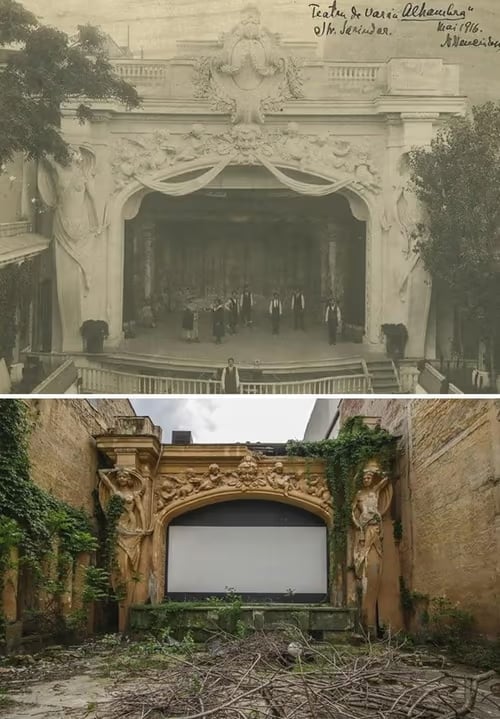
Source: Reddit
We can only imagine how fun and exciting seeing a play in those days must have been. The building has still retained its exquisite detailing, even though vines have taken over. It has a special quality to it, regardless of the 100-plus years of decay.
Manhattan Bridge, New York
It’s pretty amazing how certain landmarks are still recognizable over long periods of time. One of these landmarks is New York’s famous 6,000-foot-long Manhattan Bridge, separated by two different eras. The first image – taken in 1908 – shows the bridge during its construction and the second shows how it looks standing today.
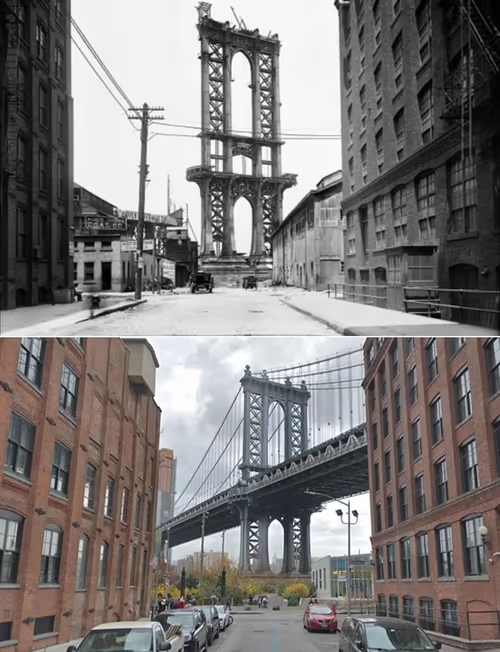
Source: Twitter
The 1908 image illustrates how young and quiet the city felt. This is compared to 2021 with the buildings and cars surrounding the completed bridge. It took 14 years, $15 million, and 600 workers to finish this iconic landmark.
Milan, Italy
When picturing Italy, we think about all the grand cathedrals, stunning architecture, and colorful waterways. Milan, Italy, in particular, contains some of the most influential structures.
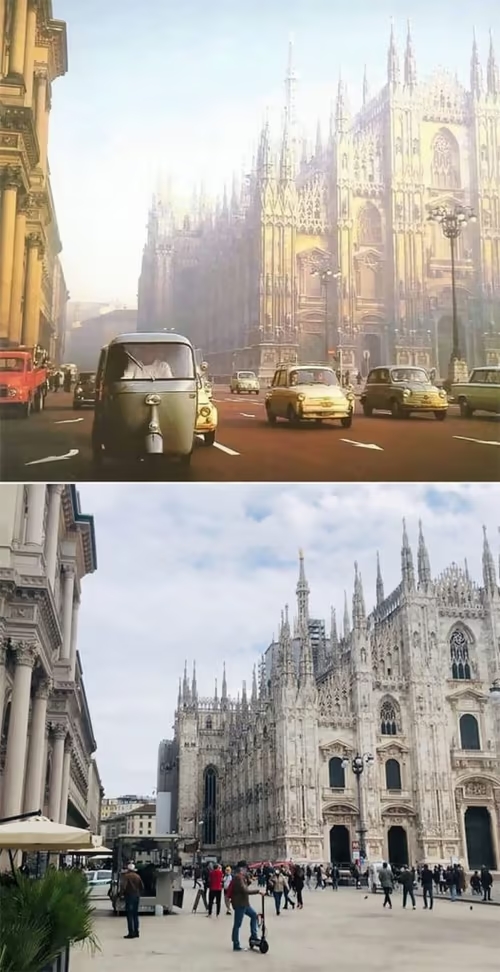
Source: onedio
Even though these photographs were snapped 70 years apart, the structures haven’t moved and still stand tall. The only notable difference is that the roads from the 1950s were taken out and replaced with a huge walking square.
103 Years Ago - Arctic Edition
“I’m melting,” no it’s not the Wicked Witch of the West but rather the Arctic ice at sea. It is reported that summer Arctic sea ice has been shrinking at a rate of 13% per decade and these photos certainly show it.
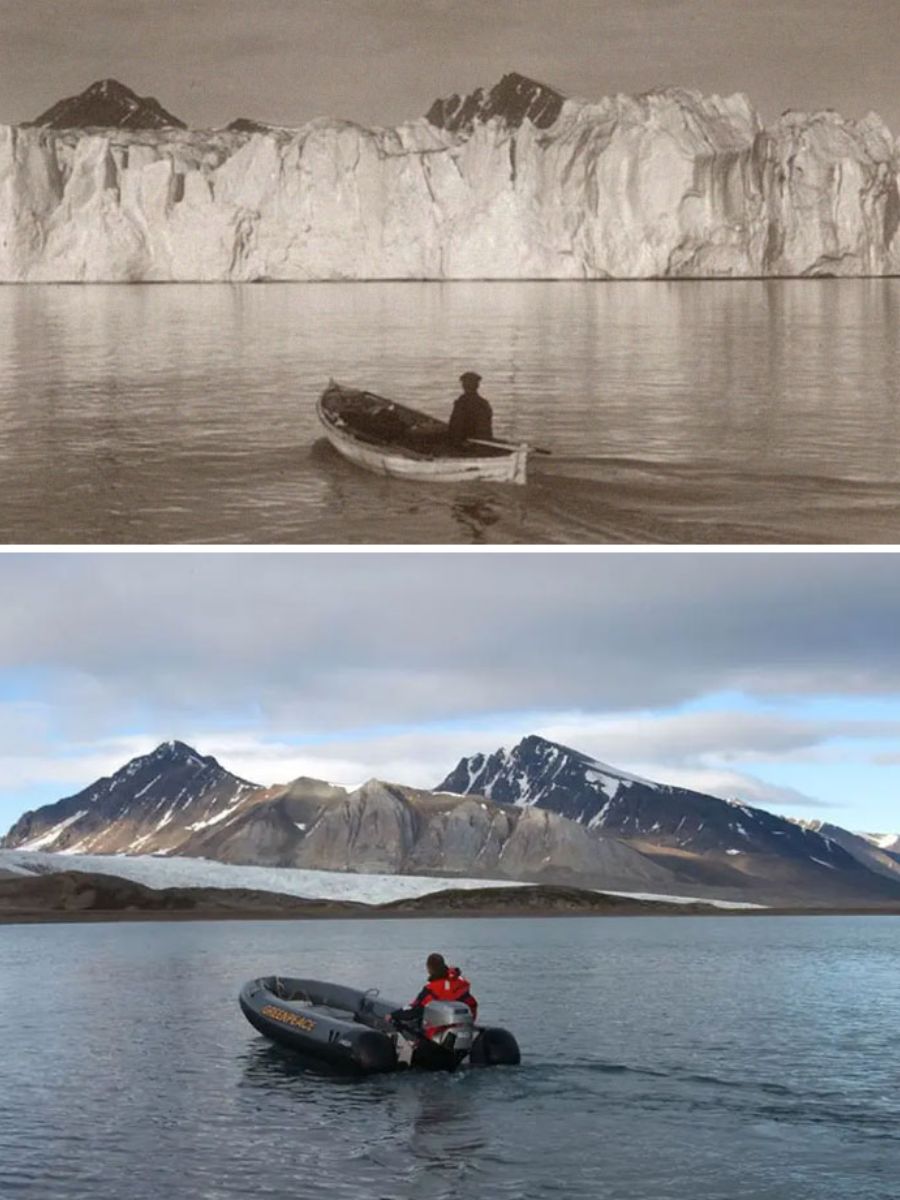
Source: Reddit / tweeted by @parveenkaswan
In a mere 30 years, the snow’s depth on the sea ice has lowered by more than 33% while looking solely at the western part of the Arctic. When you look at photos 103 years apart it’s safe to say that it is even more apparent and not in the best possible way.
The Shambles In York, United Kingdom - Late 1800s And Present Day
Dating back to the 14th century is the historic street called the Shambles. The Shambles in York, England has preserved medieval buildings so old that can transport anyone back to a different time.
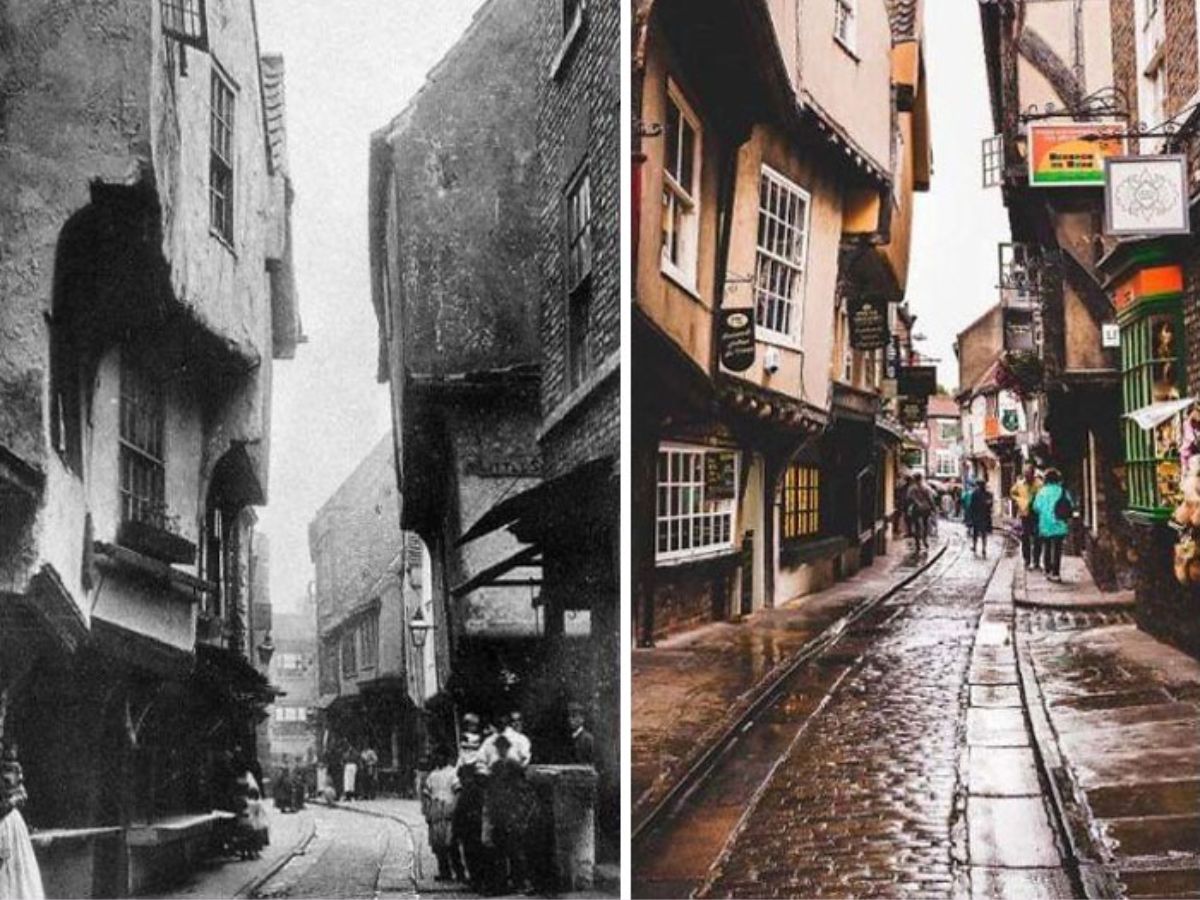
Source: Reddit
Fun fact is that it is said to have been the inspiration behind a famous spot in the Harry Potter series, Diagon Alley. It looks like the magic of preservation was hard at work since these side-by-side snapshots are almost spot on.
Biking Berlin Kreuzberg, 1985 vs. 2018
The more things change, the more they stay the same. Here is the perfect example, biking in Berlin Kreuzberg in 1985 there is a giant wall and yet Berlin locals are still biking in front of Engelbecken-Hof with or without the wall.
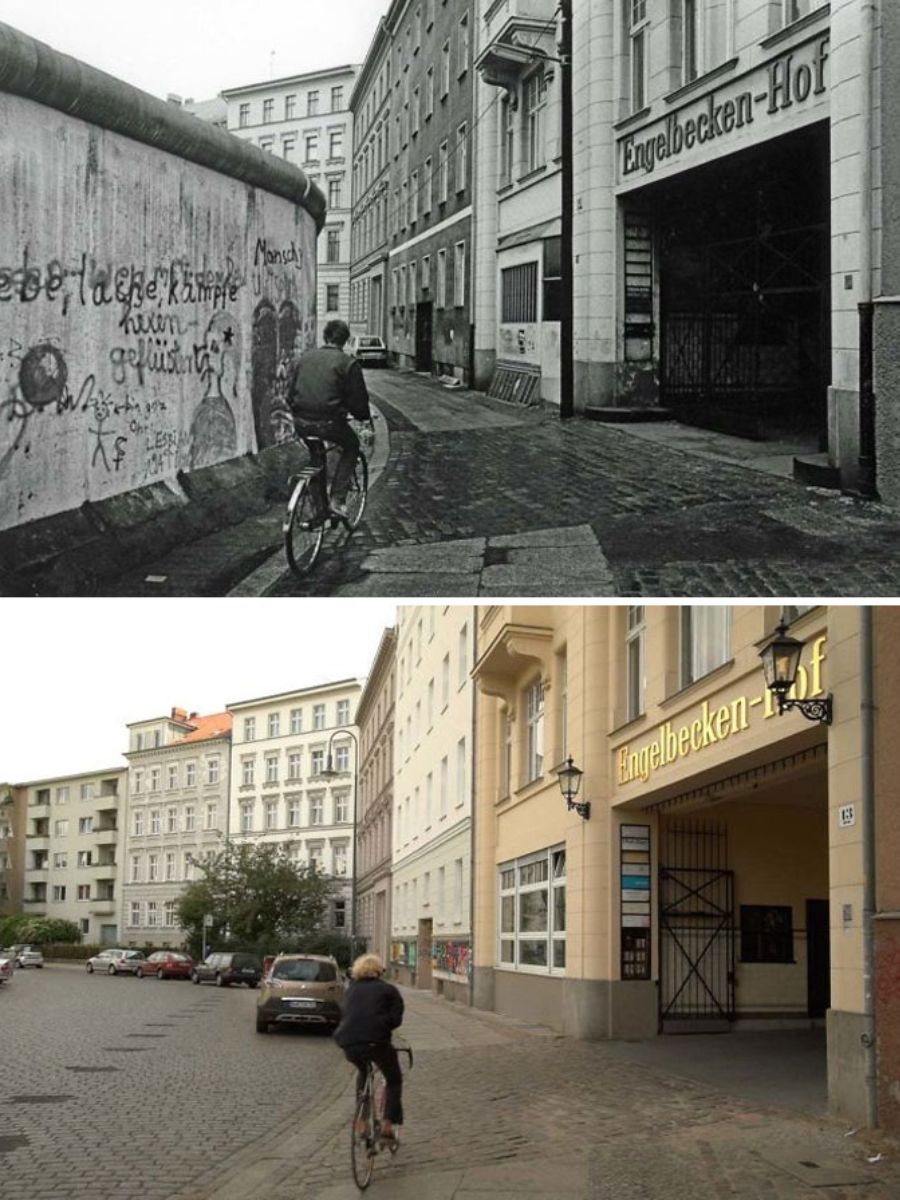
Source: Reddit / X (Twitter)
At least now bikers have a little more space to roam free. Let’s just hope the Berlin weather is in their favor.
Moscow's Radisson Collection Hotel - 20 Years Apart
Talk about a literal “glow up” of Moscow’s Radisson Collection Hotel. The Russian Hotel is one of many of the Radisson Hotels worldwide. Radisson is an international hotel chain with its headquarters in the United States.
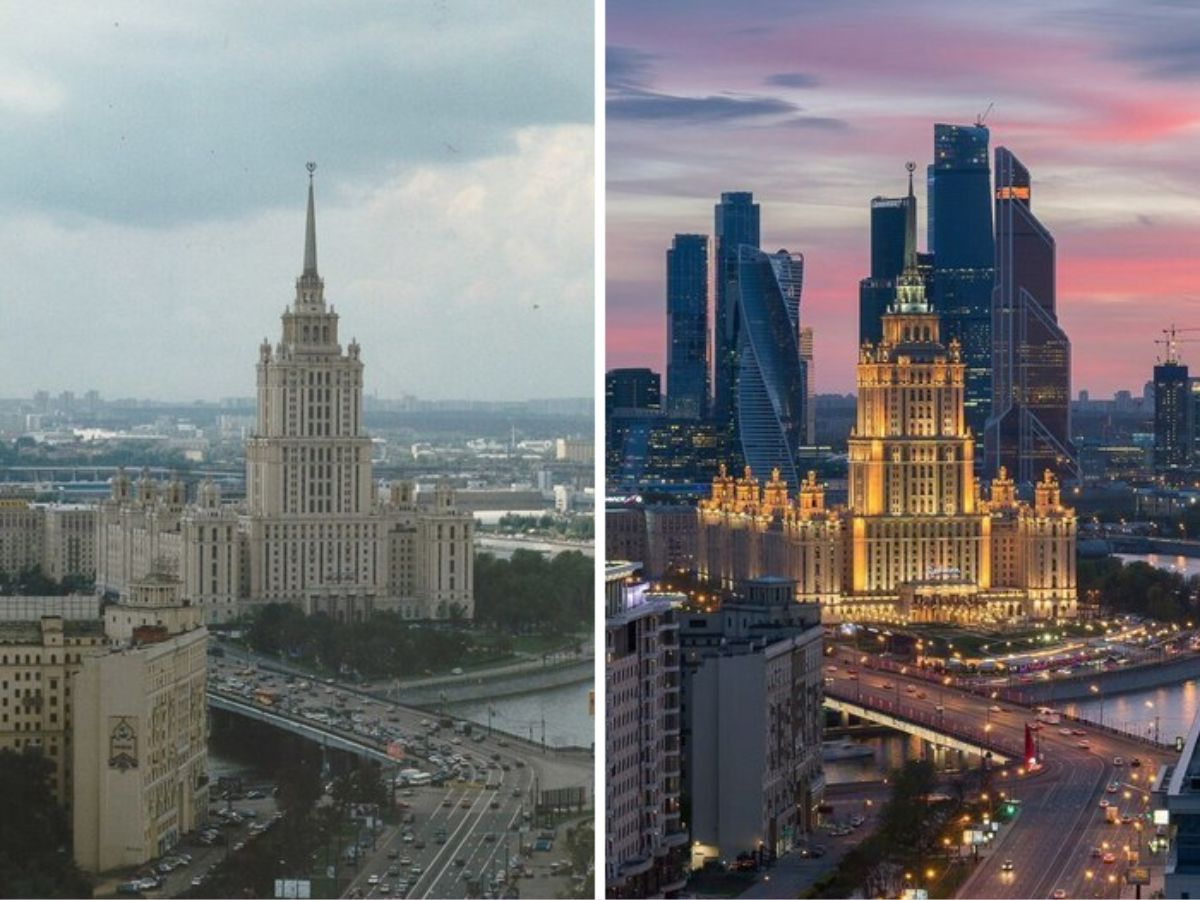
Source: Reddit / Tfue2
The hotel both then and now remains luxurious and has no plans of slowing down. It is located in the busiest intersection between Moscow’s Kutuzovskiy Prospekt and Novy Arbat.
New York's Flatiron Building 1917 VS. 2012
The Famous Flatiron Building (Originally, the Fuller Building) is a triangular 22-story, 285-foot-tall (86.9 m) steel-framed landmarked building in New York City. It is located in the Flatiron District neighborhood of Manhattan and has become an attraction for locals and tourists alike.
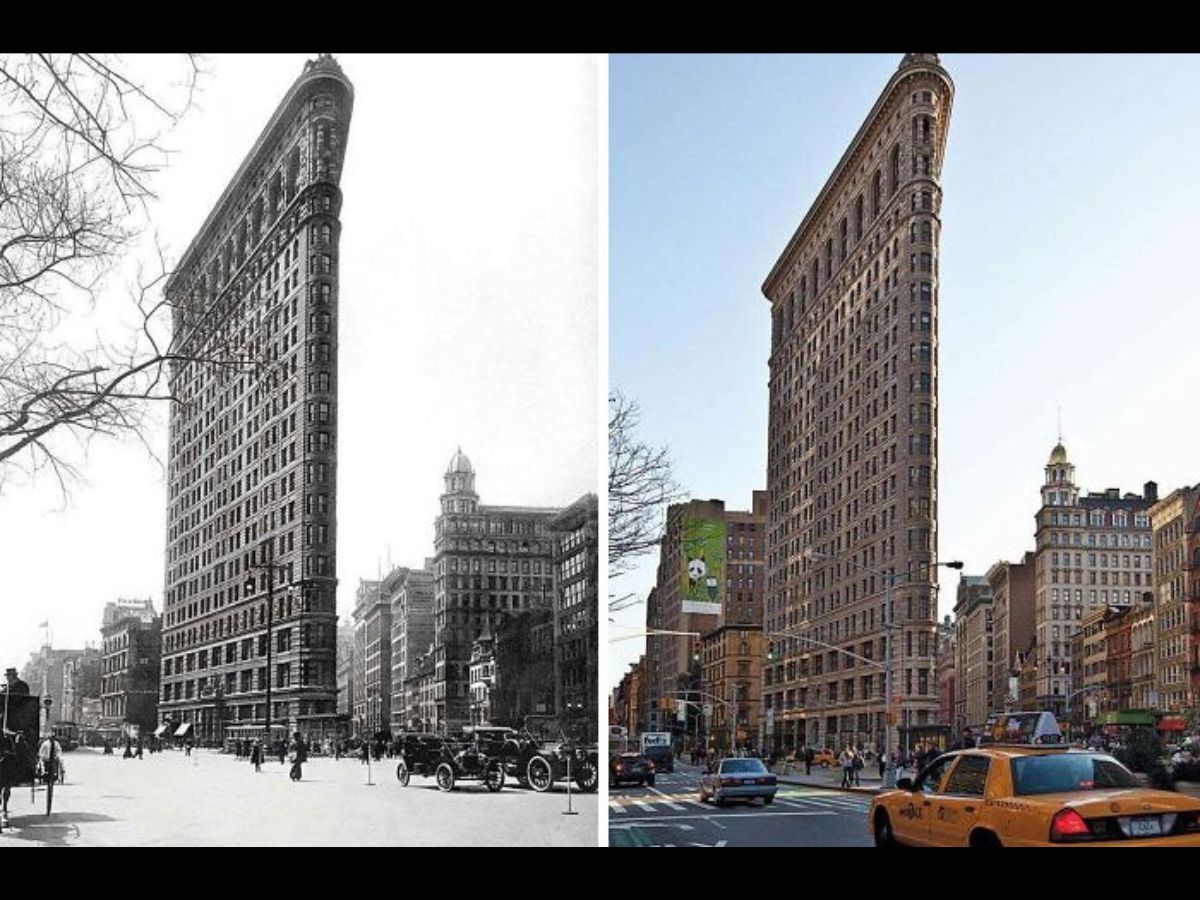
Source: Reddit / OldPhotosInRealLife - chriscambridge
It looks like nothing much has changed here besides the cars and the street ads. These photos are perhaps the epitome of time moving and standing still simultaneously.
Early 200s Singapore vs. Now
Singapore has before our eyes become the place to be, a place of luxury and innovation from the moment you land at the airport. As an island country and city-state in maritime Southeast Asia it is surrounded by water and the views do not disappoint.
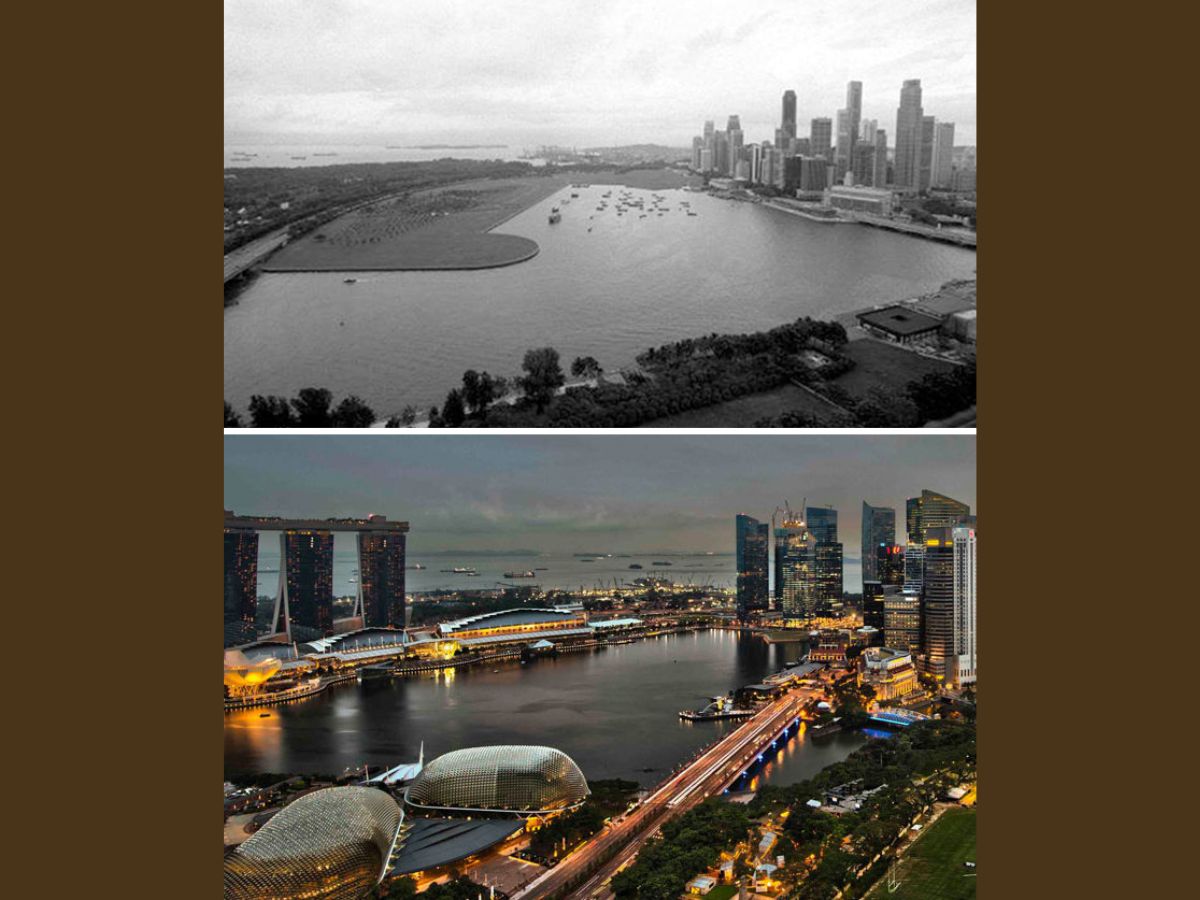
Source: Reddit
Both then and now photos have their own charm, but you can see that Singapore has progressed mountains and has no signs of slowing down any time soon.
